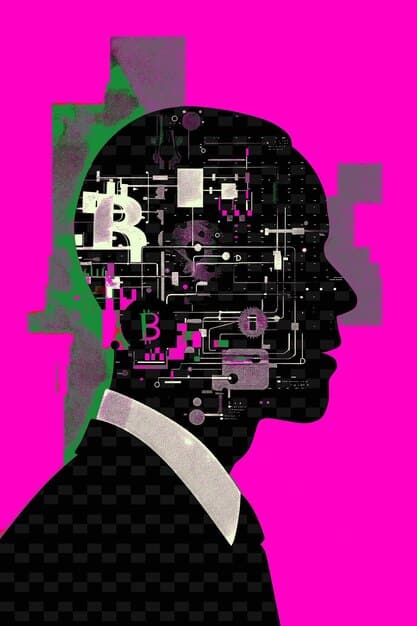Blockchain Identity Management: Securing US Citizens Digital Identities

Blockchain-based identity management offers a secure and transparent way for US citizens to control their digital identities, reducing fraud and enhancing privacy through decentralized and immutable systems.
In an increasingly digital world, the security of personal information is paramount. **Blockchain-based identity management: securing digital identities for US citizens** is emerging as a groundbreaking solution to address vulnerabilities in traditional identity systems. This technology has the potential to revolutionize how Americans manage and protect their personal data.
Understanding Blockchain-Based Identity Management
Blockchain-based identity management represents a significant departure from conventional, centralized identity systems. By leveraging the decentralized and cryptographic nature of blockchain technology, it offers a more secure, transparent, and user-centric approach to managing digital identities.
This innovative approach promises to mitigate risks associated with identity theft, fraud, and data breaches, which are persistent concerns in the digital landscape.
Key Principles of Blockchain Identity
At its core, blockchain identity management operates on several fundamental principles that distinguish it from traditional systems. These include decentralization, immutability, transparency, and user control.
- Decentralization: Unlike centralized databases, blockchain distributes identity information across a network, reducing the risk of a single point of failure.
- Immutability: Once data is recorded on the blockchain, it cannot be altered or deleted, providing a tamper-proof record of identity attributes.
- Transparency: All transactions and identity updates are visible to authorized participants on the network, fostering trust and accountability.
- User Control: Individuals have greater control over their identity data, determining who has access to their information and for what purposes.
In essence, blockchain identity management seeks to empower individuals with ownership and control over their digital identities, while simultaneously enhancing security and privacy.

The adoption of these principles can lead to more robust and trustworthy identity ecosystems, benefiting both individuals and organizations.
Benefits for Us Citizens
For US citizens, the benefits of blockchain-based identity management are multifaceted and far-reaching. From enhanced security and privacy to streamlined access to services, this technology has the potential to transform various aspects of daily life.
It’s about giving people more control over their digital lives and mitigating the risks of identity-related crimes.
Enhanced Security and Privacy
One of the primary advantages of blockchain identity management is its ability to enhance security and privacy. By decentralizing identity information and employing cryptographic techniques, it becomes exceedingly difficult for malicious actors to compromise personal data.
Moreover, individuals can selectively disclose identity attributes without revealing unnecessary information, reducing the risk of data exposure.
Streamlined Access to Services
Blockchain identity management can also streamline access to a wide range of services, from government benefits to financial products. With a single, verified digital identity, citizens can avoid the cumbersome process of repeatedly providing identification documents.
- Government Services: Simplifying access to social security, healthcare, and voting processes.
- Financial Services: Facilitating secure and efficient transactions, loans, and insurance applications.
- Healthcare: Ensuring secure and interoperable medical records, improving patient care and data privacy.
This streamlined approach not only saves time and resources but also reduces the potential for errors and fraud.
Ultimately, **blockchain-based identity management** offers a more efficient, secure, and user-friendly way for US citizens to interact with various services and institutions.
Challenges and Considerations
While the potential benefits of blockchain-based identity management are compelling, there are also challenges and considerations that need to be addressed. Issues such as scalability, interoperability, and regulatory compliance must be carefully navigated to ensure successful implementation.
Without addressing these key areas, blockchain identity solutions risk falling short of their promise.
Scalability and Performance
One of the major challenges is scalability. As more users and transactions are added to the blockchain network, it’s crucial to maintain high performance and transaction speeds.
Inefficient blockchain designs can lead to bottlenecks and delays, hindering widespread adoption.
Interoperability and Standards
Another critical consideration is interoperability. Different blockchain platforms and identity solutions must be able to communicate and exchange data seamlessly to avoid fragmentation and vendor lock-in.
- Standardization: Establishing common protocols and data formats to facilitate interoperability.
- Collaboration: Encouraging cooperation among industry stakeholders to develop open standards.
Without interoperability, the true potential of blockchain identity management cannot be fully realized.

Addressing these challenges is essential to unlock the transformative power of blockchain identity management for US citizens.
Regulatory and Legal Landscape in the Us
The regulatory and legal landscape surrounding blockchain-based identity management in the US is still evolving. While there is growing recognition of the technology’s potential, policymakers are grappling with how to best regulate its use while fostering innovation.
Clear and consistent regulations are needed to provide clarity and certainty for businesses and individuals.
Existing Laws and Regulations
Currently, there are no specific laws in the US that exclusively govern blockchain identity management. However, existing laws related to data privacy, consumer protection, and cybersecurity may apply depending on the specific use case.
For instance, laws like the California Consumer Privacy Act (CCPA) and the Health Insurance Portability and Accountability Act (HIPAA) could impact how blockchain identity solutions handle personal data.
Future Regulatory Trends
Looking ahead, it is likely that we will see more tailored regulations specifically addressing blockchain identity management. These regulations may focus on issues such as data governance, liability, and consumer rights.
- Data Governance: Establishing rules for data collection, storage, and use.
- Liability: Clarifying who is responsible for data breaches or misuse.
- Consumer Rights: Giving individuals greater control over their personal information and how it is used.
The development of clear and consistent regulations is crucial for fostering trust and promoting the responsible adoption of blockchain identity management in the US.
In summary, the regulatory landscape is dynamic, and stakeholders must stay informed and engaged to navigate the evolving legal framework.
Use Cases and Applications
Blockchain-based identity management has numerous potential use cases and applications across various sectors in the US. From government services to healthcare and finance, this technology can revolutionize how individuals interact with organizations and institutions.
It offers solutions that are more secure, efficient, and user-friendly than traditional methods.
Government Services
One of the most promising use cases is in government services. Blockchain identity management can streamline processes such as voting, accessing social security benefits, and obtaining driver’s licenses.
By creating a secure and transparent system for verifying identity, governments can reduce fraud and improve service delivery.
Healthcare
In the healthcare industry, blockchain identity management can enhance data privacy and interoperability. Patients can securely store and share their medical records with healthcare providers, ensuring that their information is protected and accessible when needed.
- Secure Data Sharing: Allowing patients to control who has access to their medical records.
- Interoperability: Enabling seamless exchange of medical information between different healthcare providers.
This can lead to better patient care and more efficient healthcare systems.
The potential applications of **blockchain-based identity management** are vast and transformative, offering solutions to many of the challenges facing US citizens and organizations.
The Future of Blockchain Identity in the Us
The future of blockchain identity management in the US looks promising, with ongoing innovation and increasing adoption across various sectors. As the technology matures and regulatory frameworks become clearer, we can expect to see even more widespread use of blockchain-based identity solutions.
The next few years will be critical in shaping the trajectory of this transformative technology.
Emerging Trends and Technologies
Several emerging trends and technologies are shaping the future of blockchain identity management. These include advancements in decentralized identifiers (DIDs), verifiable credentials, and privacy-enhancing technologies.
DIDs and verifiable credentials provide a standardized way for individuals to prove their identity and qualifications without relying on centralized authorities. Privacy-enhancing technologies, such as zero-knowledge proofs, enable individuals to share information without revealing the underlying data.
Potential Societal Impact
The widespread adoption of blockchain identity management has the potential to create a more secure, transparent, and equitable society. By empowering individuals with greater control over their personal data, it can foster trust and accountability in the digital realm.
- Reduced Identity Theft: Making it harder for criminals to steal and misuse personal information.
- Increased Privacy: Giving individuals more control over how their data is shared and used.
As blockchain identity management continues to evolve, its impact on US citizens and society as a whole is likely to be profound.
| Key Point | Brief Description |
|---|---|
| 🔑 Enhanced Security | Blockchain provides robust security for digital identities through decentralization and cryptography. |
| 🛡️ User Control | Individuals gain control over their identity data, deciding who accesses their information. |
| 🌐 Streamlined Access | Simplified access to government, financial, and healthcare services. |
| ⚖️ Regulatory Challenges | Navigating the evolving legal landscape is crucial for successful implementation. |
Frequently Asked Questions
▼
Blockchain-based identity management uses decentralized and cryptographic techniques to secure digital identities, giving individuals more control over their personal data while enhancing security.
▼
Blockchain decentralizes identity data, making it difficult for hackers to compromise. Immutability ensures data cannot be altered, providing a tamper-proof record.
▼
US citizens can benefit from enhanced security, streamlined access to services, and greater control over their digital identities, reducing fraud and protecting their data.
▼
Challenges include scalability, interoperability, and regulatory compliance. These need to be addressed to ensure successful implementation and widespread adoption of blockchain.
▼
The future includes emerging trends like decentralized identifiers (DIDs), verifiable credentials, and privacy-enhancing technologies, promising a more secure digital society.
Conclusion
In conclusion, **blockchain-based identity management** holds significant promise for securing digital identities for US citizens, offering enhanced security, user control, and streamlined access to services. Addressing the challenges and navigating the regulatory landscape will be crucial for realizing its full potential and creating a more secure digital future for all Americans.





